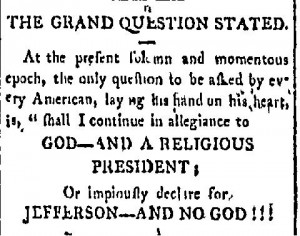 No, I’m not endorsing the construction of additional walls between the United States and Mexico. There are plenty of those and they may be of questionable value. Instead, it is Thomas Jefferson’s birthday and I’m quoting from Christopher Hitchens (who shared his birthday with Jefferson) in repurposing and inverting Reagan’s famous request of Gorbachev. Hitch promoted the Jeffersonian ideal of separating out the civic from the religious:
No, I’m not endorsing the construction of additional walls between the United States and Mexico. There are plenty of those and they may be of questionable value. Instead, it is Thomas Jefferson’s birthday and I’m quoting from Christopher Hitchens (who shared his birthday with Jefferson) in repurposing and inverting Reagan’s famous request of Gorbachev. Hitch promoted the Jeffersonian ideal of separating out the civic from the religious:
Be it enacted by General Assembly that no man shall be compelled to frequent or support any religious worship, place, or ministry whatsoever, nor shall be enforced, restrained, molested, or burthened in his body or goods, nor shall otherwise suffer on account of his religious opinions or belief, but that all men shall be free to profess, and by argument to maintain, their opinions in matters of Religion, and that the same shall in no wise diminish, enlarge or affect their civil capacities.
from Jefferson’s Virginia Statute for Religious Freedom
A rather remarkable continuation of Enlightenment concepts that derive, typically, from a notion of “natural rights” and, even in the Virginia Statue, from religious concepts: “Whereas, Almighty God hath created the mind free.” With the following paragraphs noting that human rulers are fallible and have tended to create false religions down through time, apparently regardless of God’s wishes.
Natural rights are an interesting idea that re-occurs in the Declaration of Independence and were also championed by George Mason in the Virginia Declaration of Rights. The notion that natural rights did not extend to slaves was something that Jefferson was conflicted about, according to Hitchens, until the end of his life, with the issue of state’s rights a pragmatic basis for opposition to an institution that he both profited from and found morally repugnant.
Natural rights might also be derivable from something like Rawl’s “veil of ignorance,” which, in this capacity, just reiterates what might be more simply considered a method for minimizing the interference of people in the behavior and thoughts of other people. This concedes that evolving perspectives on interference may reduce the universality of any claim concerning those rights. But an interference model only accounts for specific categories of rights. The right to schooling provided via taxation would not be covered, nor would the right for equality in dealings in the civic space. In fairness, Rawls’ argument about rights is greater than this minimal fragment, but both show how jettisoning a deontological approach to ethics yields testable hypotheses.
Michael Boylan’s “Are there natural human rights?” in the Stone Reader covers the controversy in some detail, describing the agency and capability theories, as well as objections from Chinese and Islamic sources. The latter rise to the level of problematic, for if the individuals within a society complain that outside perspectives on natural rights are not their own, is there any sense of universality in natural rights? Oppressing women is Allah’s will, after all, and is therefore “natural.”
And so, on Thomas Jefferson’s birthday, I have to commemorate one of the greatest contributions to our modern world: a secular state with definable rights of conscience and radical freedoms, regardless of how natural that might be.
RT @ExUnoPlura: Build Up That Wall: No, I’m not endorsing the construction of additional walls between the United States and Mexi… https:…